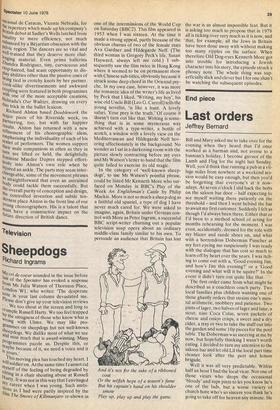T elevi si o n
Sheepdogs
Richard Ingrams
1,4Y cri de coeur sounded in the issue before fiast of the Spectator has evoked a response On Ms Julia Watson of Thornton Place, London W1 , who writes: 'The desperate np?te in your last column devastated me. 'ease don't give up your television reviews ' • We too shout at the screen and long to eirumple Russell Harty. We too feel trapped the smugness of those who know what is "113ng with Ulster. We may like protra Mmes on sheepdogs but not well-known tneepdogs. We dislike most of what we see
'd miss much that is award-winning. Many Programmes puzzle us. Despite this, or aYbe because of it, we need a voice and it is Yours.'
This moving plea has touched my heart. I will soldier on. At the same time !cannot rid Yself of the feeling of being degraded by
tting in a chair shouting abuse at Russell riarty. It was not in this way that! envisaged tl!Y career when I was young. Such ambita.,1°os as I had were partly inspired by the larn The Snows of Kilimanjaro re-shown in
one of the intermissions of the World Cup on Saturday (BBC2). This film appeared in 1953 when I was sixteen. At the time it made a strong appeal, partly because of the obvious charms of two of the female stars Ava Gardner and Hildegarde Neff. (The third woman in Gregory Peck's life, Susan Hayward, always left me cold.) I subsequently saw the film twice in Hong Kong where it seemed to be on permanent show with Chinese sub-titles, obviously because it struck some deep chord in the Oriental psyche. In my own case, however, it was more the romantic idea of the writer's life as lived by Peck that! liked. 'Writing, my boy', his wise old Uncle Bill (Leo G. Carroll) tells the young novelist, 'is like a hunt. A lovely safari. Your prey is the truth.' Of course it doesn't turn out like that. Writing is something that is in some mysterious way achieved with a type-writer, a bottle of scotch, a window with a lovely view on the Mediterranean and Hildegarde Neff hovering affectionately in the background. No wonder as I sat in a darkening room with the picture slowly contracting before my eyes and Ms Watson's letter to hand that the film quite failed to exercise its old magic.
In the category of 'well-known sheepdogs', to use Ms Watson's pointful phrase, could be listed Mr Kenneth More who surfaced on Monday in BBC's Play of the Week An Englishman's Castle by Philip Mackie. More is not so much a sheep-dog as a faithful old spaniel, a type of dog I have never much cared for. We were asked to imagine, again, Britain under German control with More as Peter Ingram, a successful BBC script-writer churning out a popular television soap opera about an ordinary middle-class family similar to his own. To persuade an audience that Britain has lost the war is an almost impossible feat. But it is asking too much to propose that in 1978 all is ticking over very much as it is now, and 'that, for example, all the Jews in Britain have been done away with without making too many ripples on the surface. When therefore Old Dog-eyes Kenneth More got into trouble for introducing a Jewish character into his story, the episode struck a phoney note. The whole thing was superficially slick and clever but! for one shan't be watching the subsequent episodes.


































 Previous page
Previous page